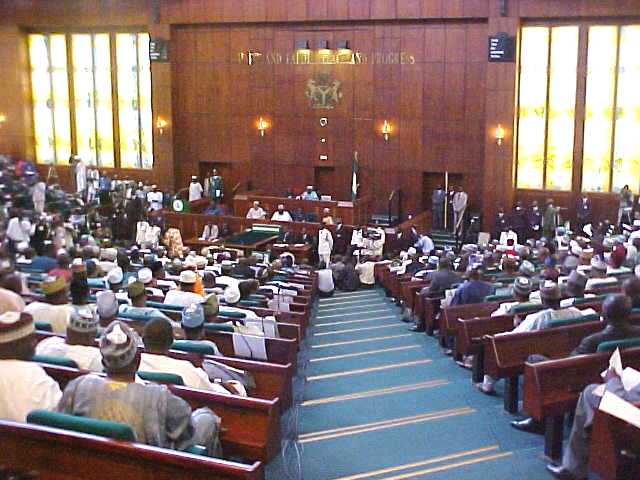Political Issues
An Assembly of Lice and Mice -By Majeed Dahiru

I watched the former chairman of the House of Representatives’ Committee on Appropriations, Hon. Abdulmumin Jibrin on Sunday evening, July 31, on a highly anticipated prime time television programme on Channels TV. I was full of expectations, hoping that the nation will get a clearer picture of the recurring crisis surrounding the 2016 Appropriation Act. As a major stakeholder in the budgeting process, I, as many other Nigerians looked forward to Hon Jibrin, a ranking member representing the Kiru\Bebeji Federal Constituency of Kano State in the green chambers, to sieve the cacophony of conflicting voices by presenting a clear and objective picture of the situation. I watched with rapt attention for over half an hour expecting to hear a fresh perspective from one of Nigeria’s most influential law makers. To my greatest disappoint, all the revelations by Hon. Jibrin were all but exclusive. He merely rehashed what was already in the open. His accounts of events were full of contradictions as he tried hard to play the victim in a matter that is purely political and an internal power play within the House of Representatives. However, in admitting that the National Assembly has powers to alter the budget, by going as far as inserting projects, he changed the narrative from padding to “senseless insertions” which is a highly subjective matter because what is senseless in one constituency may be sensible in another. He made it clear that the appropriation process in the House is such that no single man can write a budget. According to him, three members of the Appropriation Committee are seconded to each of the other committees in the House, without which their endorsements, their work on the budget, would not be accepted by the appropriations committee. Therefore, turning around to accuse the leadership of the House of “padding” or later, “senseless insertions”, is illogical and contradictory.
Furthermore, his revelations clearly show the enormous power of the Appropriations Committee, contrary to his allusion that the powers of the Committee are exaggerated. This also indicates that any discrepancy in the appropriation process cannot be done without the knowledge and connivance of the Appropriations Committee, and particularly its chairman.
Hon. Jibrin is one politician who is not afraid of controversies. Educated to the highest level, with a Doctorate Degree in international relations, his rise to prominence was meteoric. He was first elected into the House of Representatives in 2011 on the platform of the PDP. Shortly after his election, he was arraigned alongside Aliyu Akwe-Doma, former governor of Nassarawa State, on allegations of money laundry, through his company, Green-Trust, amounting to 15 billion naira. He was later discharged accordingly. In what will become his style of politics, he mobilised his fellow first-termers to move against the establishment candidate of the then ruling PDP, Hon. Mulikat Adeola Akande and supported Hon. Aminu Waziri Tambuwal in a keenly contested election for the position of speaker of the House of Representatives. Hon Tambuwal emerged as speaker in complete defiance of the leadership of the PDP, and Hon. Jibrin was rewarded with the powerful chairmanship of the House Committee on Finance. Hon Jibrin was re-elected in 2015 but this time on the platform of the APC. History repeated itself again when Hon. Jibrin, who initially wanted to be speaker, but later opted to support Hon. Femi Gbajabiamila in exchange for the position of deputy speaker but was turned down, eventually joined forces with some members of the House to elect Rt. Hon Yakubu Dogara as the speaker of the Eighth House of Representatives, against the establishment candidacy of Hon. Femi Gbajabiamila. This time he was rewarded with chairmanship of the House Committee on Appropriation. Since his removal, Hon. Jibrin has come to denounce the leadership of the House as very corrupt, first accusing them of padding the budget but now modifying this as senseless insertions.
Watching Hon. Jibrin, I saw an angry man. A man feeling betrayed by the system he helped to build. He has fallen but won’t fall alone without pulling the whole house down. He appears determined to do this. I see a man who is trying to win public sympathy in a fight over a matter that is personal and far from public interest, by labelling his opponents as corrupt, a tactics that is quite potent in this era of an anti-corruption frenzy. He is being helped a great deal by members of the House of Representatives who belong to the faction opposed to Speaker Dogara. They see this as opportunity to replace the House leadership with their preferred candidates. Like lice and mice, these lawmakers who are insiders, are doing a great damage to the institution of the legislature, in parasitic quest for power and personal satisfaction and not for the interest of the nation. Like lice and mice, their utterances and actions have brought a great damage to the image of the National Assembly, the most significant arm of a constitutional democratic government and an institution they personally benefit from. From the theatrics of absurdities, it is very important to separate facts from fiction.
Budget “padding” is a criminal affair that is an invention of the executive and not the legislature. Some top government officials insert and inflate budgetary estimates with the intention to personally profit from the proceeds through a very fraudulent procurement process, which is predetermined to favour their preferred lackeys that will return the financial proceeds in the form of cash to them. They call it “kick-back”. The very impressive budget 2016, the very first in the life of the Muhammadu Buhari presidency was marred in controversy from the very beginning. First it was reported to have “disappeared” but “reappeared” and the Presidency, in a veiled admittance, asked the national assembly to work on the” reappeared” version because errors were detected in the “disappeared version”. This was closely followed by the discovery of 10 billion naira in the budget estimates of the Ministry of Education, presented by the executive, under a very suspicious sub-head because of its ambiguity and vagueness. This shocking discovery was made in so many other MDAs. This is the real “padding”. Ministers and permanent secretaries feigned ignorance and blamed the discrepancies on a “budget mafia”. in a swift reaction, the director general of the Budget Office, Yahya Gusau and other top management staffs were sacked. Some other heads of departments and agencies, especially those appointed by former president Goodluck Jonathan, were also sacked. This clearly shows that the blame for budget “padding” is one for the executive.
The National Assembly has the powers of appropriation. This is contained in the 1999 constitution as amended, in section 81 sub-section 1,2,3 and 4. The intention of this constitutional provision is to ensure wider consultation in the affairs of finance and planning of a constitutional democracy such as Nigeria and to ensure checks and balances among all three arms of government. The National Assembly has the powers to increase and reduce line item expenditure, insert and remove projects if they are deemed in the best interest of the nation. These projects, whether constituency or regional interventions, are not given in cash to any member of the National Assembly. The projects are entirely for the executive to implement according its own rules and regulation. This singular role is what distinguishes the National Assembly as the most important arm of a democratic government. The parliament came into existence in Great Britain because of the need to regulate taxation and the expenditure of the Crown, primarily. With the great charter or “magna carter” issued in 1215, King John of England laid the foundation for the rule of law and accountability of the Crown to its subjects. The United States’ Constitution in Article 1 Section 9, Clause 7 vests in the congress the powers of appropriation. The 53 man standing committee on appropriations in the United States congress, is one of the most powerful. Its members and leadership wield a lot of influence in the budgeting process and attract a lot of projects to their constituencies. The sub-committee chairmen in the larger appropriations committee are usually referred to as “Cardinals” and they rarely loose re-election because of the quantum of projects and empowerments that they attract to their constituencies. World over, lawmakers are primarily elected to make laws for the good governance of their countries, which includes appropriation laws, with each lawmaker struggling to attract a fair share of projects for their constituencies. The extent to which the National Assembly can exercise this power can only be checked by the executive through lobbying, positive compromise and transparent management of resources and not by bullying or intimidation, because absolute power corrupts absolutely.
The executive must do more to improve the quality of lives of the citizenry. The systematic failure of the executive to create wealth and move more Nigerians from the poverty threshold will further put more pressure on the members of the National Assembly, who are closer and more accessible to the people to insist on having constituency projects as a stop gap measure to alleviate the suffering of their constituents. The executive should also strengthen our anti-corruption institutions to drastically curtail the abuse of power and privileges by elected and appointed public officers in all arms and tiers of government, so that Nigerians can benefit maximally from corporate good governance as guaranteed by constitutional democracy.
Majeed Dahiru writes from Abuja and can be reached through dahirumajeed@gmail.com









